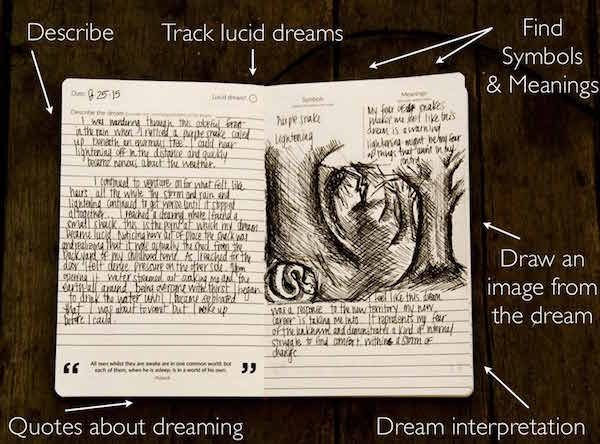The Science Behind Dream Journals & Lucid Dreams

Dreams have long captured humankind’s imagination—vivid landscapes of the unconscious that bring together disparate thoughts, emotions, and memories into coherent wholes.
A dream journal can make all the difference. It captures fleeting moments and has lasting beneficial effects on mental and emotional well-being.
This blog explores the science of dream journals, their benefits, and why starting one now could open up endless opportunities for personal growth, creativity, and mental wellness.
What Are Dream Journals? A Simple Yet Powerful Tool
Dream journals are dream documents. You should scribble out details as soon as they arise or during the day, with the goal of writing as much information as possible. Over time, this practice helps you recall dreams more vividly and explore deeper meanings behind them.
Why start a dream journal, and what are its advantages? Let’s dive deeper.
How Writing Down Dreams Strengthens Memory
A study on Phenomenological narrative analysis of dreams shows that dream recall is linked to the amount of attention you give to your dreams.
- Narrative structure: Writing one’s dreams helps capture one’s narrative structure and provide a concrete text for phenomenological analysis, unveiling deeper psychological meanings. Also, writing down your dreams allows for personal reflection, integration, and insight into subconscious patterns and emotional states.
- Neuroplasticity: Recording your dreams helps promote neuroplasticity–the brain’s capacity for change. By actively engaging with them, writing down dreams helps enhance memory recall, allowing you to remember images, emotions, symbols, and themes from your dreams.
- Sleep Cycle Insight: Recording your dreams can provide valuable insight into your sleep cycles. If you find yourself forgetting most or all of them frequently, that may indicate not getting enough REM sleep—the stage where most vivid dreams happen—which dream journals provide. Dream recording provides invaluable data regarding one’s overall sleep health.
Actionable Tip:
Start by writing just a few sentences about your dreams every morning. Over time, you’ll notice that your dream recall improves, and you may even start remembering multiple dreams from the same night.
Boosting Mental Health and Emotional Clarity
Dreams are often a mirror of our subconscious mind. They can alter our thoughts, feelings, and unresolved emotions. A study on Dreams and the rediffusion of barely mentalized experiences concluded that dreams arise from signs linking unsettled perceptions to a broader set of oneiric symbols. The Dream’s main antagonist represents the “I,” whose responses shape the Dream’s emotional and conceptual core.
- Cognitive-Behavioral Therapy (CBT): Journaling is an invaluable asset in Cognitive-Behavioral Therapy (CBT). Through journaling, CBT seeks to identify and alter unhelpful thoughts and behaviors; writing down your dreams offers therapeutic self-reflection as well as emotional regulation.
- Nightmares and Stress Reliever: Journaling can help reduce nightmares or troubling dreams triggered by fear or anxiety, reducing emotional charge while decreasing frequency. Many have found that writing down nightmares helps lower their emotional charge and thus decreases distressful dreams altogether.
Actionable Tip:
Use your dream journal as a space for reflection. After writing down your dreams, identify recurring themes or emotions. Ask yourself if they relate to current events or unresolved feelings in your waking life.
How Dream Journals Fuel Your Imagination
One of the most captivating aspects of dreams is their capacity to spark creativity. British Psychological Society colleagues suggest that daily dream dairy can encourage a cross-ferment between the dream world and creative areas of your mind.
This helps make creative targets more accessible and evolve into common dreams.
- Scientific Studies on Creativity: According to a 2009 Consciousness and Cognition study, people who maintained dream journals were better at tapping into their creative potential. Dreams, with their seemingly abstract symbols, were discovered to increase creativity and innovation in daily life.
- Dreams of Notable Creatives: Some of the foremost thinkers and artists. Salvador Dali famously recordedrecorded his dreams in a written journal, coupled with drawings for surrealist paintings. Elias Howe was inspired to develop the sewing machine by a dream. While struggling with his invention, he saw Natives wielding spears with holes near the tips; this gave him the idea for adding a hole at the tip of his needle that solved an essential design flaw in his design and led him eventually to patent his first successful sewing machine design. Dreams all inspired James Cameron’s ideas for The Terminator.
Actionable Tip:
If you’re an artist or writer, try sketching or writing about a dream that feels particularly strange or inspiring. You might find the seed of your next big creative project.
Related: Attribute Listing for Super-charged Creativity
The Science of Lucid Dreaming

Lucid dreamers often report that writing down their dreams is crucial for becoming more aware of them in the first place. Keeping a dream journal increases your self-awareness in dreams, which can eventually lead to clarity.
Also, a home dream precognition study shows that Dream journaling can sometimes reveal more than just the events of your day—it might even offer a glimpse of the future.
In the study, participants were asked to dream about a specific image, and when shown several options later, they picked the one they had dreamed about. While there wasn’t a clear connection to things like sensitivity or belief, the results hint that our dreams could occasionally tap into something beyond the ordinary.
- Reality Checks: Dream journals also help establish “reality checks”—moments in your dreams when you pause to question if you’re dreaming. By recording your dreams daily, you become more attuned to the signs and patterns that indicate you’re in a dream.
Actionable Tip:
If you’re interested in lucid dreaming, start writing down any “odd” elements of your dreams, like flying or unusual people. As you document these, you’ll begin to recognize these signs when they appear in future dreams, allowing you to take control.
Reflection and Relaxation
There’s massive evidence that regularly writing a dream journal can lead to a relaxed and quality sleep.
Dream journals help prevent nightmares, providing an effective form of relaxation and mindfulness practice before bedtime. Many find they sleep better when including journal writing as part of their evening routine.
- Reduce Nighttime Anxiety: Journaling about dreams may help reduce nighttime anxiety and lead to more profound, more restful slumber. Journaling may provide an effective outlet for pent-up emotions before bedtime – relieving anxiety before heading for restful sleep and relief at bedtime.
Actionable Tip:
Try writing or recalling for 5-10 minutes before bed. This will help you clear your mind, reduce stress, and prepare for a more peaceful night’s sleep.
Why You Should Start a Dream Journal Today
The science behind dream journals shows their immense benefits on mental, emotional, and creative well-being. From improving dream recall to increasing creativity and improving mental well-being, dream journals’ importance is unmistakable.
So don’t wait—start writing down your dreams today and discover the magic world of the subconscious. Not only could this help you better interpret them, but it may also open new channels of personal growth, creativity, and sleep improvement.







1 Comment
[…] can blur your sense of direction. But deep inside, there’s still a version of you that dreams. Focus on your goal for success. Set tiny goals, the kind that feel doable. Then build from there. […]